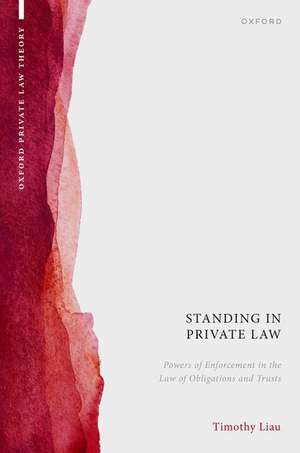Standing in Private Law: Powers of Enforcement in the Law of Obligations and Trusts: Oxford Private Law Theory
Autor Timothy Liauen Limba Engleză Hardback – 21 iul 2023
Preț: 659.48 lei
Preț vechi: 944.88 lei
-30% Nou
Puncte Express: 989
Preț estimativ în valută:
126.19€ • 137.50$ • 106.33£
126.19€ • 137.50$ • 106.33£
Carte tipărită la comandă
Livrare economică 14-19 aprilie
Preluare comenzi: 021 569.72.76
Specificații
ISBN-13: 9780192869661
ISBN-10: 0192869663
Pagini: 368
Dimensiuni: 165 x 240 x 25 mm
Greutate: 0.67 kg
Editura: OUP OXFORD
Colecția OUP Oxford
Seria Oxford Private Law Theory
Locul publicării:Oxford, United Kingdom
ISBN-10: 0192869663
Pagini: 368
Dimensiuni: 165 x 240 x 25 mm
Greutate: 0.67 kg
Editura: OUP OXFORD
Colecția OUP Oxford
Seria Oxford Private Law Theory
Locul publicării:Oxford, United Kingdom
Recenzii
Standing in Private Law is a ground-breaking work, shining a light upon the neglected private law standing rules and urging a clarity of thought from which the developed public law standing rules might also benefit. It is a work of deep theory, building upon the writing of some of the great legal theorists of the 20th and 21st centuries...The understanding that Dr Liau encourages will have significant effects on private law legal doctrine.
This is not a voluminous book. However, each chapter is packed with in-depth analysis of theories and doctrines...This book might be best placed in an academic setting.
In a remarkable book full of insights for both familiar and new problems, Dr Liau meticulously unpacks the concept of standing in private law, distinguishing it from adjacent concepts which could obscure it from view, and shows how recognising standing as a distinct private law concept can help us understand, illuminate, and perhaps even resolve debates and difficulties in private law doctrine...despite the 'deep theory' the themes and arguments of the book are undoubtedly also relevant for those wrestling with problems in the very practical world of banking and financial law. They will find many insights within its pages. All need this excellent book on their bookshelf should the issues it discusses arise.
The novelty and ambition of Standing in Private Law truly shines - in forcing us to interrogate and clarify a term which has been used all too infrequently and all too imprecisely. To conclude with one final sense of 'standing': Standing in Private Law certainly stands out as a rigorous and rich contribution to an area of private law which has long awaited such a work.
That Standing in Private Law prompts these kinds of questions is, as I see it, a testament to its quality: it is what one expects genre-defining work to do. In a book launch earlier this year, one commentator remarked that Liau had, with this monograph, essentially "invented a new field". I doubt this is an overstatement. Standing in Private Law is a remarkable piece of work. It is elegant and erudite, and sure to enrich - or at least agitate - its reader's view of private law and its role within common law legal systems.
This is not a voluminous book. However, each chapter is packed with in-depth analysis of theories and doctrines...This book might be best placed in an academic setting.
In a remarkable book full of insights for both familiar and new problems, Dr Liau meticulously unpacks the concept of standing in private law, distinguishing it from adjacent concepts which could obscure it from view, and shows how recognising standing as a distinct private law concept can help us understand, illuminate, and perhaps even resolve debates and difficulties in private law doctrine...despite the 'deep theory' the themes and arguments of the book are undoubtedly also relevant for those wrestling with problems in the very practical world of banking and financial law. They will find many insights within its pages. All need this excellent book on their bookshelf should the issues it discusses arise.
The novelty and ambition of Standing in Private Law truly shines - in forcing us to interrogate and clarify a term which has been used all too infrequently and all too imprecisely. To conclude with one final sense of 'standing': Standing in Private Law certainly stands out as a rigorous and rich contribution to an area of private law which has long awaited such a work.
That Standing in Private Law prompts these kinds of questions is, as I see it, a testament to its quality: it is what one expects genre-defining work to do. In a book launch earlier this year, one commentator remarked that Liau had, with this monograph, essentially "invented a new field". I doubt this is an overstatement. Standing in Private Law is a remarkable piece of work. It is elegant and erudite, and sure to enrich - or at least agitate - its reader's view of private law and its role within common law legal systems.
Notă biografică
Timothy Liau is an Assistant Professor in Private Law at the London School of Economics and Political Science. He previously held the position of Assistant Professor at the National University of Singapore (NUS), and prior to that, Stipendiary Lecturer in Law at Merton College, Oxford. He holds an LLB from NUS, where he was top First and Lee Kuan Yew Gold Medallist. He did his postgraduate studies at the University of Oxford as a Clarendon Scholar, and Graduate Prize Scholar at Merton College, reading for the Bachelor of Civil Law (BCL), MPhil, and DPhil, while also teaching Commercial Remedies on the BCL.











